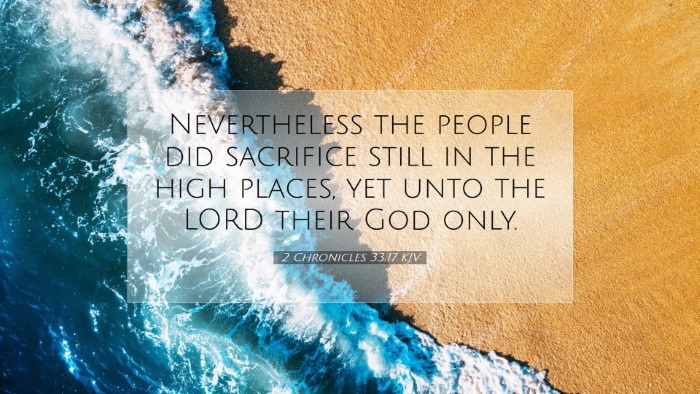Bible Commentary on 2 Chronicles 33:17
Verse Reference: 2 Chronicles 33:17
“Nevertheless the people did sacrifice still in the high places, yet unto the LORD their God only.”
Contextual Overview
This verse comes at a crucial juncture in the narrative of King Manasseh's reign. After a period of profound idolatry and disobedience, marked particularly by his extravagant pagan practices and shocking sins, Manasseh underwent a significant transformation through repentance during his exile in Babylon. Upon his return, he made considerable reforms aimed at restoring proper worship to Yahweh, though the people's adherence to high places for sacrifice persisted.
Theological Significance
The phrase “yet unto the LORD their God only” indicates a pivotal moment in the history of Israel's worship practice. It reflects a tension between the people's reformed intentions and their historical practices of worship. The duality of maintaining high places while also worshiping Yahweh emphasizes the struggle between old habits and new covenantal responsibilities.
Commentary Insights
Matthew Henry's Commentary
Matthew Henry points to the complexities of Manasseh's reforms. He notes that while there was recognition of the Lord as God, the people were still clinging to the old high places for worship—sites they were accustomed to using. Henry explains that the essence of true worship is found in the purity of devotion to God alone but highlights that the practice was often muddied by lingering pagan influences. He suggests that this syncretism reflects the challenges of fully committing to God amid entrenched cultural practices.
Albert Barnes' Commentary
Albert Barnes emphasizes that Manasseh’s reforms, though significant, were imperfect. He suggests that the high places represented a compromise: a remnant of idol worship that was not entirely dispelled from the hearts and practices of the people. Barnes indicates that while the people intended to worship Yahweh, their continued sacrifices in unauthorized high places reveal a lack of complete obedience. This dual worship exemplifies the difficulty of fully abandoning former ways and align perfectly under God's specified commands.
Adam Clarke's Commentary
Adam Clarke delves into the psychological aspect of the people’s worship practices. He argues that the lingering presence of high places indicated a reluctance to surrender fully to the Lord's demands for worship as prescribed in the Law. Clarke interprets this verse as showcasing humanity's tendency to mediate between desires of the heart and expectations of divine worship. He highlights that while the intention to worship God is present, the manner of worship remains corrupted, suggesting that practical devotion must be aligned with scriptural fidelity.
Practical Applications
From these commentaries, several practical lessons can be drawn for modern believers:
- Embrace True Worship: Encourage faithful adherence to biblical worship practices, avoiding the temptation to blend cultural elements that conflict with God’s commands.
- Reflect on Compromise: Consider personal and communal areas where syncretism may exist, leading to a diluted faith. Evaluate if worship practices genuinely align with a commitment to God.
- Teach the Power of Repentance: Highlight the importance of genuine repentance and transformation, as illustrated by Manasseh's life, and its necessity in the journey of faith.
- Promote Encouragement: Foster accountability among congregants to encourage one another towards purity of worship, sharing struggles related to clinging to old habits.
Conclusion
2 Chronicles 33:17 encapsulates a critical moment of transition for the people of Israel under King Manasseh. This transition illustrates the ongoing challenges believers face in worship, where intention often conflicts with practice. The commentaries of Henry, Barnes, and Clarke provide valuable insights into the complexities of spiritual reform and the necessity for a worship experience rooted solely in fidelity to God. As the church grapples with similar issues today, these lessons serve as essential reminders for a faithful spiritual journey.


